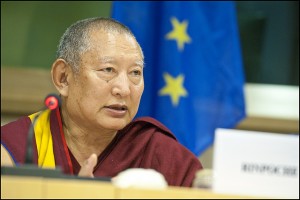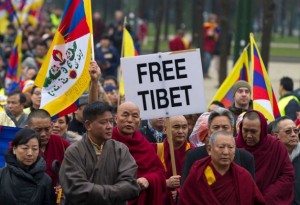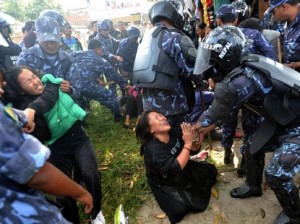 This month, the Kyabje Kirti Rinpoche began a tour through six European nations to highlight 60 years of China’s oppressive policies aimed at destroying the Tibetan religion, culture, environment, and language. The tour will also discuss the Tibetans protests against Chinese atrocities and genocide, for which, at the time of his visit to France, 107 Tibetans had self-immolated, 38 of them from Kirti Monastery. All of them have called for the return of His Holiness the Dalia Lama and freedom in Tibet.
This month, the Kyabje Kirti Rinpoche began a tour through six European nations to highlight 60 years of China’s oppressive policies aimed at destroying the Tibetan religion, culture, environment, and language. The tour will also discuss the Tibetans protests against Chinese atrocities and genocide, for which, at the time of his visit to France, 107 Tibetans had self-immolated, 38 of them from Kirti Monastery. All of them have called for the return of His Holiness the Dalia Lama and freedom in Tibet.
The Eleventh Kyabje Kirti Rinpoche, Lobsang Tenzin Jigme Yeshi Gyamtso Pal Sangpom, was born in 1942 and pursued his basic religious studies and training at Kirti monastery in Amdo. Following the Chinese invasion of Tibet in 1959, Rinpoche followed His Holiness the Dalai Lama in exile to India. After twenty-seven years of strict examination and debate at the three great monasteries of Sera in Southern India, Kirti Rinpoche was honored with the highest degree of Geshe in 1986. He was Minister in the department of Culture and Religion at CTA for some years.
On his lobbying tour of Europe, Kirti Rinpoche speaks in detail about the plight of the Tibetan people and the treatment of those protesting the genocide through self-immolation. Rinpoche aims to illuminate the true Chinese policies in Tibet. One example he highlights is the incident on March 16th, 2008, when 28 Tibetans were killed on a single day by Chinese security forces during peaceful protest in Ngaba, as part of the wider peaceful uprising that engulfed the entire Tibetan plateau. The youngest among the dead was a 16 years old student.
Kirti Rinpoche explained that Chinese authorities have responded to the self-immolations with even stricter measures, criminalising the burnings and handing down heavy prison sentences to those accused of “instigating” the protests. He also mentioned that the Chinese have accused the local Kirti Monastery of collaborating with exiled Tibetans to organise protests without providing any concrete evidence to substantiate their claim.
The Rinpoche focused on Eastern Tibet and Ngaba in particular because of the area’s harsher treatment since the invasion. Chinese security forces have kept Kirti Monastery and the town under virtual lockdown since 2008
when the Ngaba protests against the Beijing Olympics massed in large numbers. Tibetans in Ngaba have suffered for three generations under the communist Chinese starting with Mao’s long march in the Ngaba area in 1936-1937.
During his tour, Kirti Rinpoche also asked all refugee and exiled Tibetans to take responsibility in the light of the deteriorating situation in Tibet, and reminded them that Tibetans in Tibet are looking to the exiled community for help. He spoke before the European Parliament’s Human Rights sub-committee and called on them to take concrete steps toward helping Tibetans inside Tibet and requested an EP resolution demanding the release of jailed Tibetan activitists, full access to foreign media in Tibet, and the withdrawal of Chinese forces from Tibet territory.
Since he began his European nations tour, the co-presidents of the Assemblee Nationale for Tibet of the French Parliament, Jean Patrick Gilles and Noel Mamere, have reiterated their firm support for the Tibetan people and their fundamental human rights. They stated that the group would be urging the French President Francois Hollande to raise the issue of Tibet during his upcoming visit to China.





 Print
Print Email
Email